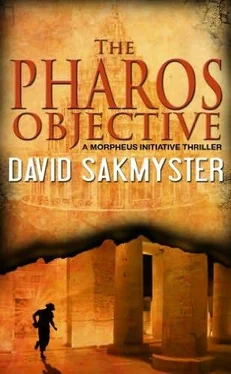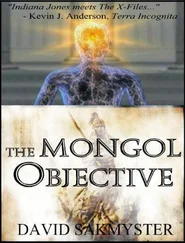David Sakmyster - The Pharos Objective
Здесь есть возможность читать онлайн «David Sakmyster - The Pharos Objective» весь текст электронной книги совершенно бесплатно (целиком полную версию без сокращений). В некоторых случаях можно слушать аудио, скачать через торрент в формате fb2 и присутствует краткое содержание. Жанр: Прочие приключения, на английском языке. Описание произведения, (предисловие) а так же отзывы посетителей доступны на портале библиотеки ЛибКат.
- Название:The Pharos Objective
- Автор:
- Жанр:
- Год:неизвестен
- ISBN:нет данных
- Рейтинг книги:3 / 5. Голосов: 1
-
Избранное:Добавить в избранное
- Отзывы:
-
Ваша оценка:
- 60
- 1
- 2
- 3
- 4
- 5
The Pharos Objective: краткое содержание, описание и аннотация
Предлагаем к чтению аннотацию, описание, краткое содержание или предисловие (зависит от того, что написал сам автор книги «The Pharos Objective»). Если вы не нашли необходимую информацию о книге — напишите в комментариях, мы постараемся отыскать её.
The Pharos Objective — читать онлайн бесплатно полную книгу (весь текст) целиком
Ниже представлен текст книги, разбитый по страницам. Система сохранения места последней прочитанной страницы, позволяет с удобством читать онлайн бесплатно книгу «The Pharos Objective», без необходимости каждый раз заново искать на чём Вы остановились. Поставьте закладку, и сможете в любой момент перейти на страницу, на которой закончили чтение.
Интервал:
Закладка:
“What did you say?” He held out a hand to stop Victor from speaking.
A sound like laughter dripped from the brownstone walls and fell from the overflowing gutters. I see your future Georgie. Oh yes. Soon, we’ll have something in common. What comes around goes around, boy. Oh yes.
Again, the laughter.
“Mother!” Waxman hissed, then all at once the rain stopped, and the whispered voice with it.
“Sir?”
Waxman cursed, fuming at the dripping rainwater, the puddles, the filling drains. Then he glared at Victor. “What?”
“It’s her. Lydia.”
Waxman looked over his associate’s shoulder, back to the bookstore, where Caleb Crowe sat with his publicist at the coffee counter. “You’re sure?”
“Yes. Using a different last name, but still her.” Victor’s eyes held that cold metallic glint common to people like him. Killers. Loyalists. As long as Nina was still out of commission, Victor was the best Waxman had to work with.
“Get me a report by eight p.m., and a transcript of what she said to him before you left.”
“Sure,” Victor said, wiping his dripping forehead. “Sorry I couldn’t stay longer. It looked like she was getting suspicious, and I didn’t want to risk Caleb recognizing me.”
Idiot. Who couldn’t blend in at a bookstore? “Fine,” Waxman said. “But begin surveillance; I want to know everything they say. Everywhere they go. Her, especially.”
As Victor walked away, Waxman lingered a moment, wishing he could trust him more, wishing he had confidence in the man’s abilities the way he had trusted Nina. She was sorely missed, in many ways.
He lingered on, until the rain came again and the whispers returned. They grew louder, more malicious, and Waxman felt a renewed chill down his spine that spread through his legs, numbing his feet and tingling his toes. He moved forward, stamping his feet. The whispers followed, and in every puddle he walked past he thought he saw his mother’s scowling face.
“Wait,” Waxman called, jogging after Victor. “We’ll share a cab.”
5
Sa el-Hagar, Egypt-March
Six months later, with Lydia now his research assistant as well as publicity agent, they began work on a sequel, a comparative study of libraries in the ancient world. The plan was to chronicle such storehouses of knowledge as King Ashurbanipal’s library at Nineveh and the Greek Pergamum, which Marc Antony had diminished to replenish Alexandria’s library for his queen. It was at the Temple of Isis in the ancient city of Sais that Herodotus and Plato had claimed the god Thoth had relocated the entirety of the world’s wisdom, all the ancient tablets and scrolls from before the flood. Some psychics, including Edgar Cayce and Madame Blavatsky, had even claimed that the refugees from sunken Atlantis had brought their advanced knowledge with them to civilize Egypt, and that Thoth had been one of their representatives, later revered as a god.
This new book touched on the legends that the Great Pyramid also had been built as an impregnable storehouse, a library to withstand time, natural disasters and the elements. Of course, Lydia would have liked first-hand evidence, and after learning of Caleb’s talents, she had pressured him into trying to gain psychic validation of these claims. He had given half-hearted efforts to please her, but nothing substantial had come of it, and they went on in their normal course of research.
On the back cover of the new book they were going to put Lydia’s favorite quote from Plato’s Timaeus — a quote that signified their book’s theme on the true essence and function of libraries: Whereas just when you and other nations are beginning to be provided with letters and the other requisites of civilized life, after the usual interval, the stream from heaven, like a pestilence, comes pouring down, and leaves only those of you who are destitute of letters and education; and so you have to begin all over again like children, and know nothing of what happened in ancient times.
It was their central thesis that these ancient libraries, filled with scrolls, clay tablets and other writings, had arisen out of the urgent necessity of preservation. With advanced knowledge of the heavens and the earth, knowledge even of man’s gross depravity, there must have been great trepidation-a sort of cosmic paranoia-about the loss of all that accumulated wisdom of humanity. Libraries, Caleb and Lydia postulated, had been originally built as magnificently constructed, earthquake- and flood-resistant structures, so that after any such upheavals, through cosmic or man-made actions, the history of human advances could be regained, and civilization could progress, rather than devolve.
To research this encyclopedic work, Lydia and Caleb set out together across Europe and the Middle East, ending up in Egypt, doing book signings for his previous book along the way. It was fairly typical for a publicist to accompany an author for part of such tours, but with Lydia it was different. Everyone knew it was different. For the past few months, they had been living together, writing and researching all day, making love at night. They enjoyed elegant dinners on the publisher’s tab and took in the occasional show or concert. But mostly, they stayed in and worked.
And fell in love.
For Caleb, the past year had been a whirlwind of twin passions: Lydia and history. Both had become entwined about him like hungry snakes, alternately pulling and squeezing back in an exotic tug of war. Neither side lost, but neither won. He shared them and matured with them both.
The book was a huge hit, translated into ten languages, and the rush of travel felt so invigorating, unlike those frustrating trips with his mother, during which he had sat brooding on the sidelines, angry at the disturbance in his life, as if he had known that other factions were waiting for his attention.
Time hurtled by, and somehow, from the depths of his dislocation and melancholy, he now found himself fulfilled. He was standing upon the ruins of an ancient Egyptian temple, hand in hand with the woman he loved. They had just wrapped up the research tour, appropriately closing with the most ancient site referenced in their new book: the crumbling town of Sa el-Hagar, the dynastic city of Sais.
Located on a branch of the Nile that flowed through the Delta, like at Alexandria, Sais was once a proud, bustling city that boasted its own share of philosophers, historians and priests, and a connection to an ancient source of secret wisdom handed down by the priests of Thoth and stored here in the temple.
The winds blew reverently through the half-collapsed columns, and sand skittered about Caleb’s feet with the scarabs and lizards. The buzzing of gnats had grown past annoying. He and Lydia both wore white scarves and khaki pants, heavy boots and wide-brimmed hats. Lydia’s face was tanned evenly, and she seemed tirelessly radiant, even with those thick oval sunglasses that reminded Caleb a bit too much of his mother when he was young.
“So what about now?” she urged, poking him in the ribs as the sun ducked behind the hills. A lonely motorboat made its way up the murky Nile, and a white-robed passenger waved to them.
“Are you serious?” He looked around. “Can’t you wait? Our hotel is-”
“No, silly.” Lydia took off her glasses and her deep green eyes sent a chill down his spine despite the heat. “I meant, what about trying your remote viewing here? Now that there’s no pressure. The book is written, our research done. You can relax and just, I don’t know, see what there is to see.”
He tried to smile. “Doesn’t work that way. It’s something that just happens, whether I want it to or not. And actually, in my family’s experience, psychic abilities seem to manifest more intensely after traumatic experiences. Stress encourages the power. My mother only started seeing visions after her father died. And Phoebe’s powers seem to have gotten stronger after her injury.”
Читать дальшеИнтервал:
Закладка:
Похожие книги на «The Pharos Objective»
Представляем Вашему вниманию похожие книги на «The Pharos Objective» списком для выбора. Мы отобрали схожую по названию и смыслу литературу в надежде предоставить читателям больше вариантов отыскать новые, интересные, ещё непрочитанные произведения.
Обсуждение, отзывы о книге «The Pharos Objective» и просто собственные мнения читателей. Оставьте ваши комментарии, напишите, что Вы думаете о произведении, его смысле или главных героях. Укажите что конкретно понравилось, а что нет, и почему Вы так считаете.












